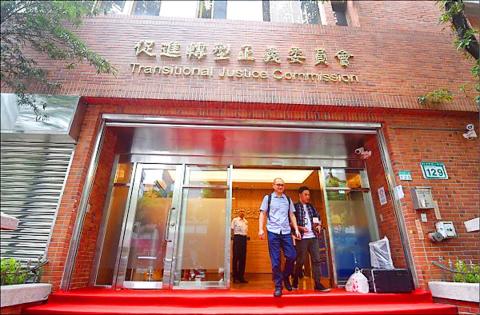The Transitional Justice Commission might be unable to review 60,567 classified political files from the Martial Law period in the National Police Agency (NPA) archives due to difficulty in the declassification process, a commission member said yesterday.
The commission is in the process of gathering political files from the period, which it hopes to cite in a draft report on transitional justice that it is to complete by the end of next year.
Under the Act on Promoting Transitional Justice (促進轉型正義條例), the commission should gather, compile and preserve political files relevant to the suppression of democracy and freedom during the authoritarian era.

Photo: Chen Yu-fu, Taipei Times
The commission this year met with the National Security Bureau (NSB), Ministry of National Defense, Ministry of Justice’s Investigation Bureau and the NPA to negotiate the declassification of political files and their handover, the commission member said, speaking on condition of anonymity.
As part of the sixth planned file handover, the Investigation Bureau plans to transfer 30,571 files to the commission, they said, adding that it has so far handed over 7,919, of which 9 percent are classified.
The NSB has 176 classified files that the commission hopes to receive, the member said.
Under archive regulations, before transferring classified files to another agency, individual agencies must first review their classification, but some of the agencies have maintained a “reserved attitude,” affecting the declassification process, the member said.
As a result, more than 60,000 classified files at the NSB and the NPA might not be declassified or cited in the report, they said.
The NSB’s classified files are believed to include information that could lead to the truth about the murder of former Democratic Progressive Party chairman Lin I-hsiung’s (林義雄) twin daughters and mother at their Taipei home on Feb. 28, 1980.
As Lins’ house was under close surveillance by police and secret service agents at the time, some believe that the murder was planned by the government as a warning to those involved in the democracy movement.
The NPA’s classified files, preserved at the agency’s office in Taipei’s Zhongzheng District (中正) and two warehouses in Liuzhangli (六張犁), include files on political figures, surveillance operations, Chinese espionage and other national security cases, the member said.
If declassified, they would shed light on how the party-state deployed police resources during the authoritarian era, they said.
With assistance from the commission, the NPA is to digitize and copy about 8,000 political cases before handing them over.
The agency would handle the files in a transparent manner, NPA Director-General Chen Ja-chin (陳家欽) said.
It has hired personnel to deal with the digitization and copying, but the process could take some time due to the number of files involved, he said, adding that after a meeting with commission representatives, the agency took them to the warehouses to look at files.
Most of files from more than a decade ago are only available in paper format and require more processing, as they are fragile, he said.
The commission can contact the NPA’s executive secretary if it finds files that it considers particularly important, he said.
Commission spokeswoman Yeh Hung-ling (葉虹靈) said that there are two ways for the commission to access classified files from government agencies.
Agencies can declassify files in their own archives, but if lawmakers pass the proposed political data act, any classified files from more than three decades ago could be declassified unless that is explicitly prohibited by law, she said.

The Ministry of Education (MOE) is to launch a new program to encourage international students to stay in Taiwan and explore job opportunities here after graduation, Deputy Minister of Education Yeh Ping-cheng (葉丙成) said on Friday. The government would provide full scholarships for international students to further their studies for two years in Taiwan, so those who want to pursue a master’s degree can consider applying for the program, he said. The fields included are science, technology, engineering, mathematics, semiconductors and finance, Yeh added. The program, called “Intense 2+2,” would also assist international students who completed the two years of further studies in

Former president Tsai Ing-wen (蔡英文) departed for Europe on Friday night, with planned stops in Lithuania and Denmark. Tsai arrived at Taiwan Taoyuan International Airport on Friday night, but did not speak to reporters before departing. Tsai wrote on social media later that the purpose of the trip was to reaffirm the commitment of Taiwanese to working with democratic allies to promote regional security and stability, upholding freedom and democracy, and defending their homeland. She also expressed hope that through joint efforts, Taiwan and Europe would continue to be partners building up economic resilience on the global stage. The former president was to first

Taiwan will now have four additional national holidays after the Legislative Yuan passed an amendment today, which also made Labor Day a national holiday for all sectors. The Chinese Nationalist Party (KMT) and Taiwan People’s Party (TPP) used their majority in the Legislative Yuan to pass the amendment to the Act on Implementing Memorial Days and State Holidays (紀念日及節日實施辦法), which the parties jointly proposed, in its third and final reading today. The legislature passed the bill to amend the act, which is currently enforced administratively, raising it to the legal level. The new legislation recognizes Confucius’ birthday on Sept. 28, the

The Taipei District Court sentenced babysitters Liu Tsai-hsuan (劉彩萱) and Liu Jou-lin (劉若琳) to life and 18 years in prison respectively today for causing the death of a one-year-old boy in December 2023. The Taipei District Prosecutors’ Office said that Liu Tsai-hsuan was entrusted with the care of a one-year-old boy, nicknamed Kai Kai (剴剴), in August 2023 by the Child Welfare League Foundation. From Sept. 1 to Dec. 23 that year, she and her sister Liu Jou-lin allegedly committed acts of abuse against the boy, who was rushed to the hospital with severe injuries on Dec. 24, 2023, but did not